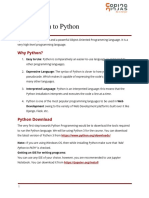0 ratings0% found this document useful (0 votes)
54 viewsVariables: When Programming It Is Often Necessary To Store A Value For Use Later On in The Program
This document discusses variables in programming and how they allow values to be stored and accessed later. It defines a variable as a labeled location in memory that can contain a value. Variables are like boxes with labels that can store information. The document also covers inputting numbers as variables and using int for whole numbers, float for decimals, and str to convert numbers to strings.
Uploaded by
armbennettCopyright
© © All Rights Reserved
We take content rights seriously. If you suspect this is your content, claim it here.
Available Formats
Download as PPTX, PDF, TXT or read online on Scribd
0 ratings0% found this document useful (0 votes)
54 viewsVariables: When Programming It Is Often Necessary To Store A Value For Use Later On in The Program
This document discusses variables in programming and how they allow values to be stored and accessed later. It defines a variable as a labeled location in memory that can contain a value. Variables are like boxes with labels that can store information. The document also covers inputting numbers as variables and using int for whole numbers, float for decimals, and str to convert numbers to strings.
Uploaded by
armbennettCopyright
© © All Rights Reserved
We take content rights seriously. If you suspect this is your content, claim it here.
Available Formats
Download as PPTX, PDF, TXT or read online on Scribd
You are on page 1/ 3
Variables
When programming it is often necessary to store a value for use later
on in the program.
A variable is a label
given to a location in
memory containing a
value that can be
accessed or changed.
Think of a variable as a
box with a label that
you can store
information in.
Example
Start
End
Match the Python code to the correct part of the flowchart.
Create a Python program based on the code above and
save it as variables.py. Press F5 to run it.
Input Name
Display Hello
+ name
Inputting Numbers
When inputting numbers into variables you need to tell
Python what data type to expect.
We use int to tell Python we are going to enter an integer (whole
number). We use float when working with decimal places.
Create a new program using this code and save it as
numbers.py.
We use str to convert a number into a string.
You might also like
- SE T04 - Variables - Storing Data in ProgramsNo ratings yetSE T04 - Variables - Storing Data in Programs13 pages
- 18-Introduction to Python-Basics, DataTypesNo ratings yet18-Introduction to Python-Basics, DataTypes24 pages
- XI-IP-Python Fundamentals-Module - III-Jun-14-2021No ratings yetXI-IP-Python Fundamentals-Module - III-Jun-14-20219 pages
- Name: Mrs Sahana Bhat Subject: Python Programming Execute Python SyntaxNo ratings yetName: Mrs Sahana Bhat Subject: Python Programming Execute Python Syntax21 pages
- CSP1150_Lecture_1_Introduction_to_Programming - Part BNo ratings yetCSP1150_Lecture_1_Introduction_to_Programming - Part B25 pages
- 02 Python Intro Installation Identifiers Variables SSNo ratings yet02 Python Intro Installation Identifiers Variables SS32 pages
- Module 1 - Data Scalability and AnalyticsNo ratings yetModule 1 - Data Scalability and Analytics18 pages
- Sequencing: The Most Simple Type of Program Uses Sequencing, A Set of Instructions Carried Out One After AnotherNo ratings yetSequencing: The Most Simple Type of Program Uses Sequencing, A Set of Instructions Carried Out One After Another4 pages
- Sequencing: The Most Simple Type of Program Uses Sequencing, A Set of Instructions Carried Out One After AnotherNo ratings yetSequencing: The Most Simple Type of Program Uses Sequencing, A Set of Instructions Carried Out One After Another5 pages



































































